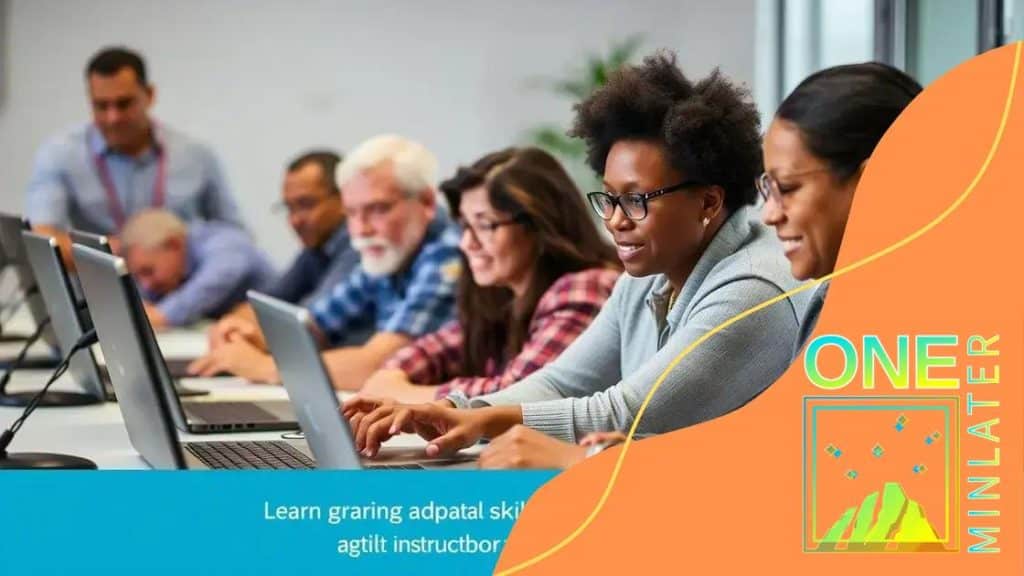Digital skills programs for adults in mid-career transitions

Digital skills programs for adults in mid-career transitions offer essential training to enhance employability and adaptability in today’s technology-driven job market.
Digital skills programs for adults in mid-career transitions are becoming essential as the job market evolves rapidly. Have you wondered how these programs can give you a competitive edge? Let’s explore their benefits.
Understanding the importance of digital skills
Understanding the importance of digital skills in today’s job market is crucial for all professionals, especially those in mid-career transitions. As technology continues to evolve, so does the need for individuals to adapt to new tools and platforms. Digital skills encompass a range of competencies that can help you remain competitive and relevant in your field.
Why Digital Skills Matter
Digital skills are not just a bonus—they are a necessity. Many employers today prioritize candidates who can demonstrate proficiency in modern technologies. Learning these skills can open doors to new opportunities and make you more versatile.
- Increased employability
- Ability to leverage technology for efficiency
- Networking opportunities through digital platforms
Moreover, developing digital skills boosts your confidence in navigating the digital landscape. Whether you are looking to enhance your productivity or engage better with clients, these skills are key to achieving your goals.
Meeting Industry Demands
The workplace is rapidly changing. Many industries now require employees to be familiar with software, social media, and even big data analytics. Organizations are seeking professionals who can not only perform their jobs effectively but also adapt to technological advancements. With the right digital skills, you will not only stay relevant but thrive.
Investing in these skills can lead to personal and professional growth. If you are unsure where to start, many programs cater specifically to adults making career transitions. Online courses, workshops, and webinars are great resources.
Key programs available for mid-career adults
Several key programs are designed specifically for mid-career adults aiming to enhance their digital skills. These programs can provide the knowledge and training necessary to navigate today’s job market effectively. Whether you seek to switch careers or advance in your current position, these offerings are tailored to meet diverse needs.
Popular Digital Skills Programs
Many institutions offer programs that cater to adult learners. These programs focus on various aspects of digital technology, ensuring you gain relevant skills. Examples include:
- Online coding bootcamps: These intensive courses teach programming fundamentals to help you launch a tech career.
- Digital marketing certifications: Gain expertise in online marketing strategies to boost your visibility and reach.
- Data analysis courses: Learn how to interpret data and make informed decisions in your organization.
Many companies, such as Google and Microsoft, provide free or low-cost resources. These can be great starting points for acquiring new competencies without the burden of significant expenses. As you look into these options, consider the required time commitment and format that best suits your lifestyle.
Choosing the Right Program
When selecting a program, think about your current skills and your goals. Finding a program that aligns with your career aspirations will help you stay motivated. A few factors to consider include:
- Course content relevance
- Flexibility in schedule
- Support and resources provided
By investing in the right training, you can build a solid foundation of digital skills that will serve you well in your career. With dedication and the right support, transitioning into a more digital-savvy role is within your reach.
How to choose the right digital skills program

Choosing the right digital skills program is essential for maximizing your learning experience. With so many options available, it can feel overwhelming. However, identifying your goals and needs can help you make an informed decision.
Assess Your Skills and Goals
Start by evaluating your current skills. Knowing where you stand will guide you in selecting a program that addresses your gaps. Ask yourself:
- What skills do I need to advance in my career?
- Am I looking to switch fields or enhance my current role?
- What is my learning style—do I prefer hands-on training or theoretical knowledge?
Once you have clarity on your goals, it becomes easier to find a program that aligns with your objectives.
Research Available Options
Next, take the time to research various programs. Look for reviews and feedback from past participants. Many institutions now offer online courses that fit a flexible schedule. Consider factors such as:
- Reputation of the institution providing the program
- Cost of the program and available funding options
- Duration and format of the course (online, in-person, hybrid)
Make a list of programs that align with your criteria. This will make it easier to compare them side by side.
Consider Support and Resources
A program that offers robust support can significantly enhance your learning experience. Look for those that provide:
- Access to mentors or industry professionals
- Networking opportunities with peers
- Additional resources for practice and further learning
These factors can make a considerable difference in how effectively you acquire new skills.
By carefully evaluating your options and focusing on your personal and professional goals, you can choose the right digital skills program that will help you succeed in your career transition.
Success stories: Adults thriving with new skills
Success stories of adults who have embraced new digital skills are truly inspiring. Many individuals have transformed their careers by pursuing digital skills programs, leading to exciting new opportunities and personal growth. These real-life examples showcase the potential impact of continuous learning.
Case Study 1: Sarah’s Journey into Tech
Sarah was a marketing professional for several years but felt stuck in her role. After identifying the growing demand for tech-savvy marketers, she enrolled in a digital marketing certificate program. Through this program, she learned about social media advertising, SEO, and data analytics. Within months, Sarah not only gained confidence but also secured a new job as a digital marketing specialist with a top company.
Case Study 2: James Transitions into IT
James worked in customer service but always had an interest in technology. He decided to take a leap and enrolled in a coding bootcamp. Although it was challenging, he persevered and developed skills in web development. Now, James is a software developer and enjoys solving complex problems every day.
- Increased earning potential: Many adults find that new skills lead to higher-paying positions.
- Personal fulfillment: Learning and applying new skills can lead to greater job satisfaction.
- Networking opportunities: Programs often provide chances to connect with industry professionals.
These success stories highlight how adults thriving with new skills can reshape their careers. Continuous learning opens doors to unexpected opportunities, creating a ripple effect in both personal and professional lives. Others can find motivation and inspiration in these examples, proving that it is never too late to learn and grow.
Tips to maximize your learning experience
To get the most from your digital skills program, it’s important to adopt strategies that enhance your learning experience. By following a few simple tips, you can improve your retention of information and gain practical skills more effectively.
Set Clear Goals
Before starting any program, define what you want to achieve. Setting clear goals helps keep you focused. Ask yourself:
- What specific skills do I want to learn?
- How will these skills help in my career?
- What timeframe do I have for completing the program?
Having a clear target can inspire you to push through challenges and stay committed.
Engage with the Content
Engagement is key when learning new skills. Participate actively in classes, ask questions, and interact with instructors and peers. Engaging with your fellow learners can lead to valuable discussions and a deeper understanding of the material. Furthermore, seek out additional resources such as books, podcasts, and videos related to the subject matter.
Practice Regularly
Applying what you learn helps reinforce your knowledge. Consider allocating time each week to practice new skills. This could include:
- Working on real-life projects or case studies
- Taking on challenges that test your abilities
- Joining online forums or groups for collaboration
Consistent practice leads to mastery and builds your confidence in using new skills.
Seek Feedback
Feedback is a powerful tool for improvement. Don’t hesitate to ask for constructive criticism from instructors or peers. Their insights can highlight areas for improvement and help you refine your skills. Remember that everyone learns at their own pace, and seeking input can accelerate your growth.
By incorporating these tips into your learning routine, you’ll maximize your experience in any digital skills program. The journey of learning is unique to each individual, and these practices can help ensure it is both effective and enjoyable.
In conclusion, investing in digital skills programs can significantly change the career trajectory of mid-career adults. By harnessing new skills, individuals can enhance their employability, tap into new opportunities, and experience personal growth. Remember, the journey involves setting clear goals, engaging actively, practicing regularly, and seeking feedback. With the right approach, anyone can thrive in today’s digital landscape.
FAQ – Frequently Asked Questions about Digital Skills Programs for Adults
What are digital skills programs?
Digital skills programs are educational courses designed to help individuals learn essential technology and digital competencies needed in today’s job market.
Who can benefit from digital skills programs?
Adults in mid-career transitions can greatly benefit from these programs, as they help them acquire new skills that enhance their employability and career prospects.
How long do these programs typically last?
The duration of digital skills programs can vary widely, ranging from a few weeks for intensive bootcamps to several months for more comprehensive courses.
What types of skills can I learn?
You can learn a variety of skills including digital marketing, coding, data analysis, and project management, all of which are crucial in the modern workforce.





